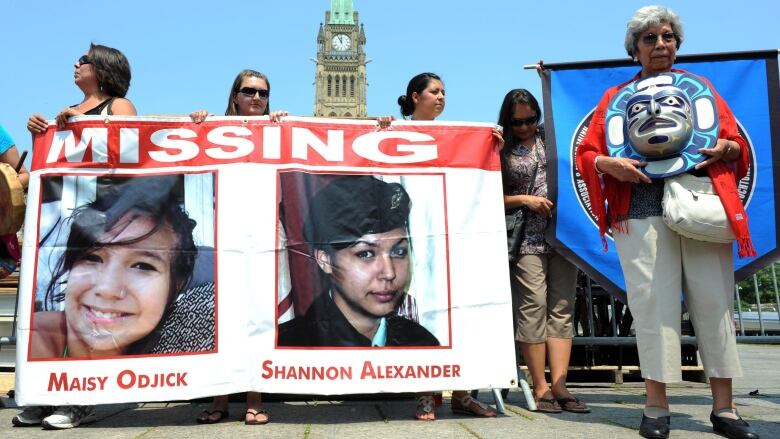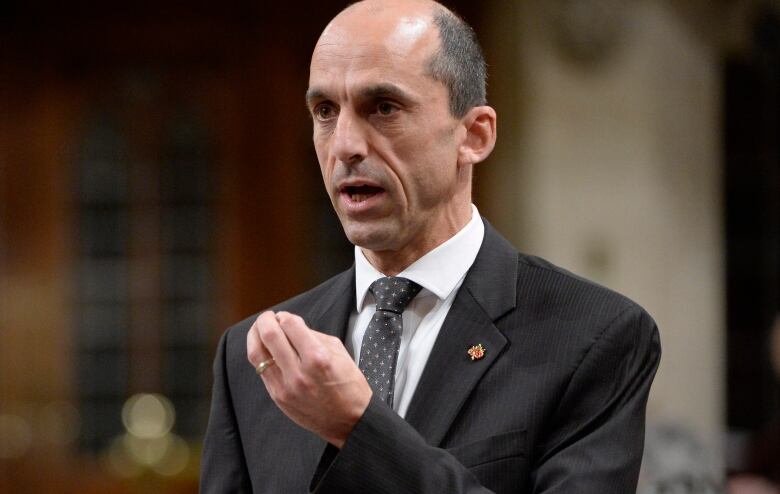RCMP database on missing persons is overdue, over budget
Harper government promise of national database for unidentified remains stalled 5 years later

An RCMP database on missing persons and unidentified remains, touted by the Harper government in 2010 as "concrete action" for the problem of murdered and missing indigenous women, is still incomplete and far over budget five years after it was announced.
The national database, plagued by technical problems, won't be fully in place until late 2016 more than three years after it was supposed to be helping police across Canada solve crimes.
- CBC Investigation: Murdered and missing girls and women
- Analysis: Focus on 'family violence' in aboriginal women cases misguided
The initial $1.6-million budget for the project has swollen to at least $2.4 million, drawing scarce resources away from other important RCMP initiatives.
CBC News uncovered details of the botched IT project through a document obtained under the Access to Information Act.
"Due to the delays, it will take another year and will cost approximately double the original estimate," says a June 28, 2015, internal evaluation of the project.
'Adverse effect'
"In addition to the financial implications, this delay has had an adverse effect on the RCMP's work with Canadian policing partners who had expected the database to be operational by early 2013."
The database was a key element of a $10-million initiative announced by the minister for the status of women, Rona Ambrose, in Vancouver on Oct. 29, 2010, as the Harper government faced pressure to call an inquiry into more than 1,000 murdered and missing indigenous women and girls.
"The disturbing issue of missing and murdered aboriginal women is one of serious concern and, as Canadians, we know aboriginal women deserve respect, dignity and the right to feel safe," Ambrose told a news conference.
That's not only disheartening, it's absolutely appalling.- Dawn Lavell-Harvard, president Native Women's Association of Canada
The RCMP created a slimmer version of the database in 2014 without much of the system's intended functionality, with software updates planned this fall and next year, Staff-Sgt. Julie Gagnon told CBC News.
She added that the incomplete tool has not yet solved any cases.
"The automated linkage analysis function has not yet resulted in any confirmed matches of missing persons to unidentified remains," she said in an email.

An internal lessons-learned document says the database project was beset with problems, including delays in getting a basic security clearance for the contractor. The RCMP itself provides security clearances for the government.
The evaluation of other aspects of Ambrose's $10-million announcement was more positive, with successful improvements to the Canadian Police Information Centre system, known as CPIC, and creation of a website where the public can provide tips to help solve crimes.
Lack of political will?
"Specifics on the value of tips submitted as a result of visiting the website are not available," the document says.
The president of the Native Women's Association of Canada says the delayed database project is yet more evidence that the government of Canada does not take the issue seriously.
"The fact that it's taking Canada so long to address this shows that it really is a lack of political will," Dawn Lavell-Harvard told CBC News from Toronto. "That's not only disheartening, it's absolutely appalling that they could treat human beings in such a way. Every week there's another aboriginal woman who goes missing."

The Harper government has continued to resist calls for a national inquiry into the problem of murdered and missing indigenous women and girls, promising action rather than study. Both the New Democratic Party and the Liberal Party promise to call an inquiry should they form government.
Ambrose's office declined comment on the delayed database, referring questions to Public Safety Minister Steven Blaney who's responsible for the RCMP.
In an email, Blaney noted that three of four initiatives reviewed by the RCMP evaluation were "fully implemented with positive results."
Blaney also said another $8.1-million project announced last year, creation of a DNA-based missing persons index as part of the RCMP'snational DNA data bank, will become a powerful tool to resolve cases of missing persons and unidentified remains, and bring closure to families.
The data bank is expected to start accepting DNA profiles in thespring of 2017.
Follow @DeanBeeby on Twitter














_(720p).jpg)


 OFFICIAL HD MUSIC VIDEO.jpg)
.jpg)



























































































